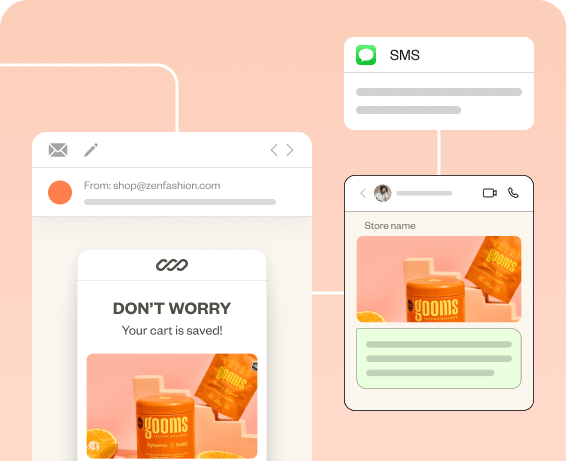A welcome email series is more than a hello. It’s your chance to turn new subscribers into loyal customers.
For e-commerce brands, it fixes common problems: cold starts, poor engagement, and weak first impressions.
A great welcome flow introduces your brand story, delivers a discount code, and guides subscribers toward their first purchase.
The first email welcomes subscribers, obviously. However, you need more sequence of welcome emails to nurture trust, build awareness, and drive conversions.
In this blog, we explain:
- What is the purpose of a welcome series email in e-commerce
- Know the key elements of high-converting welcome emails
- Get insights from real Welcome Series examples
- How to automate your welcome email flow effectively
Automate welcome emails series in a few clicks with Retainful’s easy-to-setup automation.
Why send a welcome email series?
First impressions matter. In ecommerce email marketing, they can be the difference between a one-time visitor and a lifelong customer. That’s where the ecommerce welcome email series comes in.
Here are the reasons why you should send a welcome email sequence:
320% More Revenue
Welcome emails flow generate 320% more revenue on a per-email basis than other promotional emails. That’s why it is one of the most important emails one can send in email marketing.
Because welcome emails have:
- 50-60% Open Rate (welcome email open rate and CTR benchmarks 2025 show consistent performance)
- 2-4% Conversion Rate
Higher than other promotional and transactional emails.
Building trust from day one
When someone hands over their email address, they’re taking a leap of faith. They’re saying, “I’m interested, but I’m not sure yet.”
A welcome email series is your opportunity to build trust as soon as the subscriber fills out the email sign-up form, through new subscriber onboarding emails. It’s where you introduce yourself, share your story, and start to establish a relationship. Without it, you’re leaving that trust up to chance.
First impressions matter
The moment someone subscribes, they’re interested. They’ve given you a chance.
An ecommerce welcome email series capitalizes on the initial interest by making a great first impression, ensuring that you don’t waste the opportunity to connect.
Related Reading: Learn how to grow your email list with expert tips in our blog: 15 Best Ways to Grow Email List + Examples
When Should You Send a Welcome Email Series?
The first email in the welcome email series should be sent immediately after sign up.
Welcome series timing and frequency are crucial because they set the tone for your customer’s entire relationship with your brand. Sending the first email immediately after sign-up captures the user’s attention when they’re most engaged.
Key Elements of a High-Converting Welcome Email Flow
What makes a welcome email sequence truly stand out?
It’s about nailing the essentials – those elements that turn a simple welcome email series into a lasting connection.
Here are the essential elements of a great ecommerce email welcome flow:
1. A genuine, personal brand introduction
Your first email in the best welcome email series should feel personal, almost like a conversation.
It’s your chance to introduce yourself, your brand, and why you do what you do in the welcome email flow. People connect with people, not logos.
2. Include Call to Action to explore your store
The best welcome email series examples don’t just talk to customers – they invite them to take the next step.
Whether it’s exploring your website, following you on social media, or making their first purchase, give them something to do in welcome series flow. A clear, compelling call to action turns passive readers into active participants.
3. A welcome offer to bag the first purchase
For ecommerce businesses, a welcome discount email can be the nudge that turns a new subscriber into a first-time customer.
That first-purchase incentive is critical because it’s often the hardest to secure.
More about when to give the welcome offer in the ecommerce welcome email sequence in the next section of the blog.
4. Include social proof to build trust
People trust what others trust.
Include testimonials, case studies, or user-generated content in your welcome series emails to show that others are already benefiting from what you offer.
Social proof isn’t just about bragging; it’s about building credibility and reassuring your subscribers that they’re in good company.
5. An easy way to unsubscribe
This might sound counterintuitive, but giving subscribers an easy way to unsubscribe in your welcome series emails shows confidence and helps set expectations for email content.
You’re not desperate to keep them if they’re not interested. And oddly enough, it builds trust – they’re more likely to stay when they know they can leave.
4-Step Welcome Series Email Examples (With Templates)
A well-crafted welcome email series is designed to engage new subscribers, build a relationship with them, and guide them towards the first purchase.
The best welcome series email example is:
- Email 1: Welcome Email – Warm Greeting + Brand Story (Send Immediately)
- Email 2: Value Email – Prove What Sets You Apart (Day 3–4)
- Email 3: How-to Guide – Educate & Empower Shoppers (After a week)
- Email 4: Social Proof – Win Trust With Reviews & UGC (After 10 days)
Let’s look at these examples of the welcome email series for non-buyers in detail.
Email 1: Welcome Email – Warm Greeting + Brand Story (Send Immediately)
Purpose: Introduce your brand and set expectations
What to include:
- A warm, personalized welcome message.
- Brief introduction to your brand, mission, or story.
- A call to action (CTA) such as exploring your website or following on social media.
- Optionally, a welcome discount email (e.g., discount code or free shipping)
Here is how Glossier does it in their welcome email series sample:
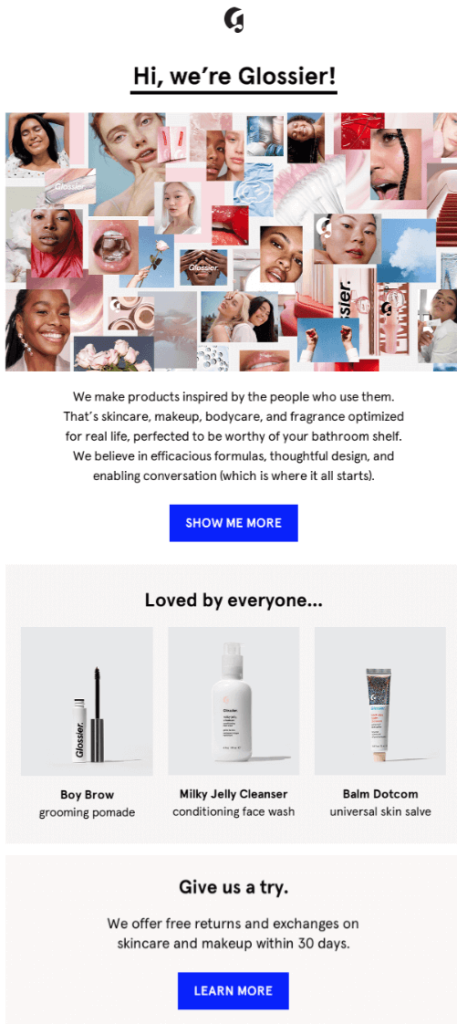
Here are some welcome series examples for sending a first-purchase incentive along with the welcome message:

This welcome sequence email example doesn’t just say “hi” – it guides, persuades, and converts. It’s the perfect example of a value-packed, customer-first welcome email.
Other than a price discount, your first email can include value-driven offers – like free shipping, a bonus gift, or early access to new drops. The goal is to incentivize action, not necessarily cut prices
Why this welcome series email example stand out?
The offer of “free returns and exchanges on skincare and makeup within 30 days” is a strong value proposition that reduces the perceived risk of trying the products.
Instead of bombarding the reader with a hard sell, this ecommerce email welcome series example focuses on starting a relationship. It introduces the brand and showcases popular products.
Email 2: Value Email – Prove What Sets You Apart (Day 3–4)
Purpose: Explain what sets your brand apart.
What to include:
- Detail the unique benefits of your products.
- Include case studies or success stories.
- Share your brand values, commitment to quality, or customer satisfaction guarantees.
Here is how Feals does it.

Why this welcome email series example stand out?
The concise, impactful heading of this welcome series email example communicates the primary benefits of the product right off the bat.
The language used in the CTA is action-oriented and taps into the urgency and need for stress relief.
The section “Why the Mints?” provides a clear and concise breakdown of the product’s key benefits.
Email 3: How-to Guide – Educate & Empower Shoppers (After a week)
Purpose: Educate about how to use your product
Sharing expert tips or a how-to guide in an e-commerce welcome email series establishes your brand as an authority in your industry.
It shows that you’re knowledgeable and committed to helping your audience succeed or get the most out of your products.
What to include:
- Instructional content like tutorials or guides
- FAQs
- Product spotlights and examples
Here is how Dossier does it.
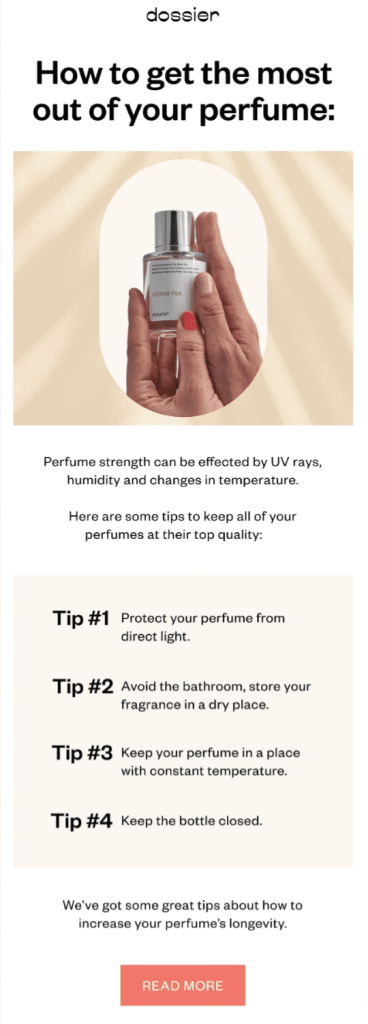
Why this welcome series email example stand out?
Dossier’s welcome series email example includes a list of four practical tips, each clearly numbered and easy to follow.
While this welcome series flow example’s primary focus is on providing tips, it subtly promotes the product by featuring it prominently in the image and in the context of the advice.
Email 4: Social Proof – Win Trust With Reviews & UGC (After 10 days)
Purpose: Build trust and foster community.
What to include:
- Highlight customer testimonials, reviews, or user-generated content.
- Invite subscribers to join your community (social media groups, forums, etc.).
- Share stories of how others are using and benefiting from your products/services.
Here is how Pulp and Press does it.

Why this welcome series email example stand out?
The testimonials featured in the welcome series email example are concise and specific and focus on different aspects of the brand’s value – quality, taste, customer service, and health benefits.
This welcome email series example ends with a clear and irresistible offer: “Don’t Miss This Deal – Get 20% Off Your First Order.”
The image at the top of this welcome email flow example shows happy, healthy individuals enjoying the product, which aligns with the brand’s message of health and wellness.
Welcome email series for buyers: For new customers who directly purchases from you instead of signing up , you have to send a post-purchase welcome email series. Learn about the first purchase welcome series here: 9 Post-Purchase Email Examples That Retain Customers
Send personalized welcome email series using Retaiful and convert more.
What If a Customer Doesn’t Purchase After the Welcome Email Flow?
Step 1: Assess their engagement level
- Did they open any of the emails?
- Did they click on any links or products?
- Are they engaging but not converting, or are they completely unresponsive?
Understanding their engagement will help you decide whether to continue nurturing them or adjust your approach entirely.
You can segment new subscribers based on email automation tools like Retainful.
Step 2: Send a ‘nudge email’ with a time sensitive offer
Offer a discount, free shipping, or a small gift to encourage their first purchase.
Sometimes, customers need an extra push to overcome hesitation. Time-limited offers create urgency.
Step 3: Send a “We’re Here to Help” Email
Addressing potential obstacles (confusion, uncertainty, or unanswered questions) helps remove barriers to purchase.
When to send the welcome offer in the welcome email sequence?
Some brands send a welcome incentive in the first email of the welcome email series to immediately convert a subscriber into a customer. Some brands wait till the third email, reserving the first and second emails as brand story email and USPs.
We recommend you to not send the offer in the first email. Here’s why:
- Welcome emails are about converting customers who are ‘problem aware’ to ‘solution aware’ in the email marketing funnel.
- If subscribers are not yet warmed up to the brand, they might ignore or undervalue the offer.
Here is a welcome email series example that has a first purchase offer in the first welcome email:
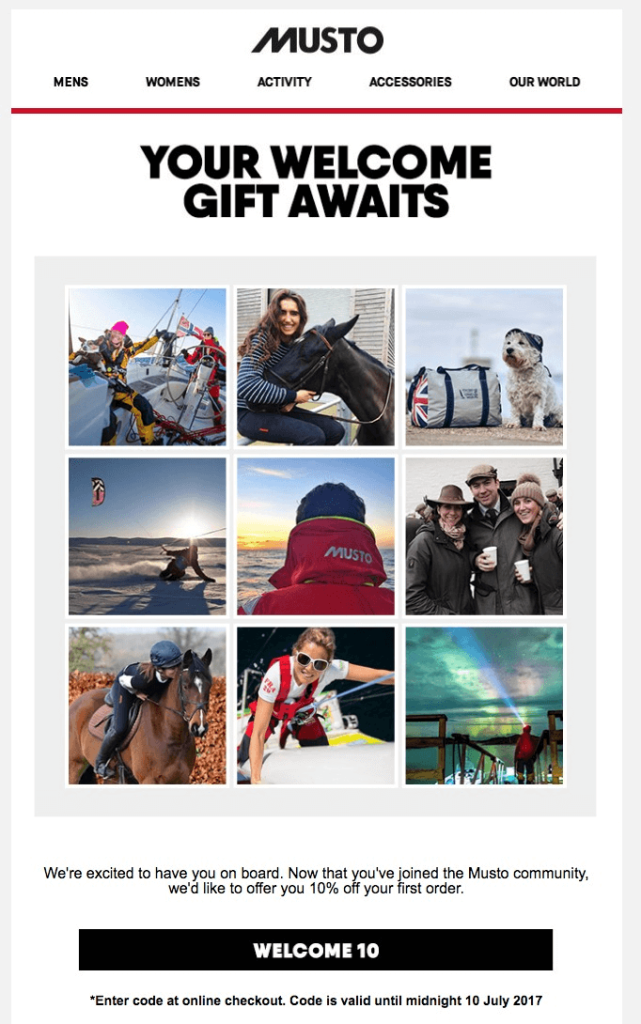
Best Practices for an Engaging Welcome Email Sequence
To write a welcome email series that converts more, you have to follow some welcome sequence best practices, like those below.
Use email automation
Use email automation to send a welcome email series automatically at well-timed intervals with send-time optimization for welcomes.
With automation, you don’t have to worry about missing the optimal window of engagement.
Automating email marketing welcome series ensures that every new subscriber receives the same high-quality welcome experience, no matter when they sign up.
It’s consistent, reliable, and frees you up to focus on other things.
Segment the new customers
Not all subscribers are created equal, and your ecommerce welcome email series shouldn’t be one-size-fits-all.
Segment your customers based on sign-up source, what they’re interested in, or even where they’re located.
Here is how to personalize your welcome email messaging based on sign-up source segments:
- Social Media Sign-Ups: Share trending products, or social media highlights (e.g., user-generated content)
- Paid Ads Sign-Ups: Reference the product or offer they clicked on.
- Organic Website Sign-Ups: Provide educational resources, product guides, or blog recommendations
- Referral Program Sign-Ups: Highlight the referral and thank their friend by name.
- Event or Webinar Sign-Ups: Share event highlights, recordings, or additional resources to keep them engaged
- Affiliate Marketing Sign-Ups: Highlight what makes your brand unique and reinforce the trust established by the affiliate
Lead with value, not the hard sell.
People don’t sign up for your emails to be sold to. They want value. Your email welcome series should give them just that. Share useful tips, exclusive content, or a behind-the-scenes look at your brand in your welcome email sequence.
Build trust first, sell later.
Encourage them to explore more
Don’t let your welcome email sequence be a one-way street or just about the purchase. Encourage your subscribers to visit the site, explore products, and buy.
How to Set Up and Automate Welcome Email Series?
Retainful is an all-in-one email marketing software used to acquire, nurture, and retain customers. It is tailor-made for ecommerce store owners like you.
Use its easy-to-set-up automation of marketing with welcome email automation to send personalized emails that convert and sell more.
With Retainful, you can send an automated welcome email series easily using:
- Pre-built welcome email series workflow
- Ready-made welcome email templates
- Drag-and-drop email editor
- Dynamic coupons
The steps to setup the welcome email series are:
Step 1: Install an email automation tool likeRetainful
Step 2: Setup triggers and wait time
Step 3: Customize the welcome email series template
Step 4: Create a welcome email flow
Step 5: Send test email
Let’s see the steps to set up a welcome email sequence in detail.
Step 1: Install Retainful
Install Retainful and connect your ecommerce store.
To automate welcome email series, go to Retainful Dashboard -> Automation. Select the automation “Welcome new customers with Dynamic coupon”.
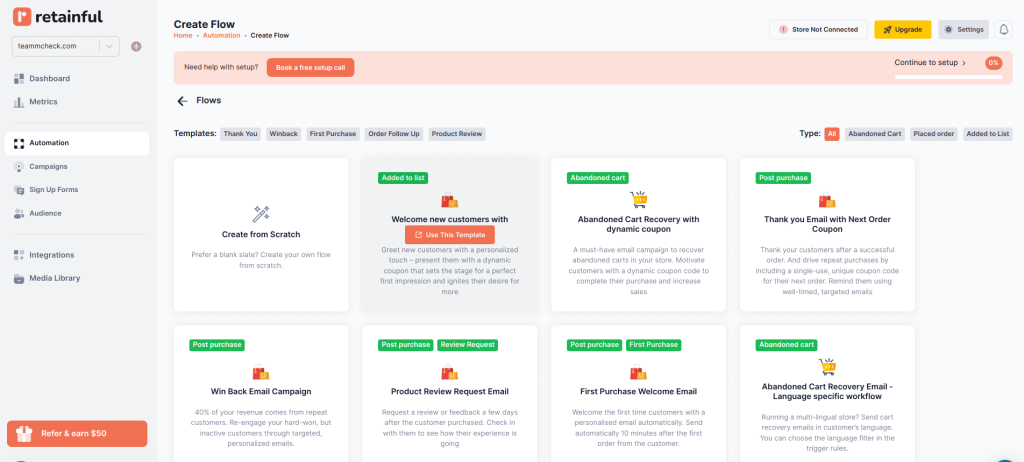
Step 2: Setup triggers and wait time
Configure the two things to set up the welcome email flow are – triggers and wait time.
The trigger lets you determine when a customer can enter into the workflow. In Retainful’s welcome email workflow, the trigger is set in such a way that first-time customers alone can enter into the workflow.
Click the Trigger block to view the trigger rules applied. You can add more rules like product ID, product name, order status, and more.
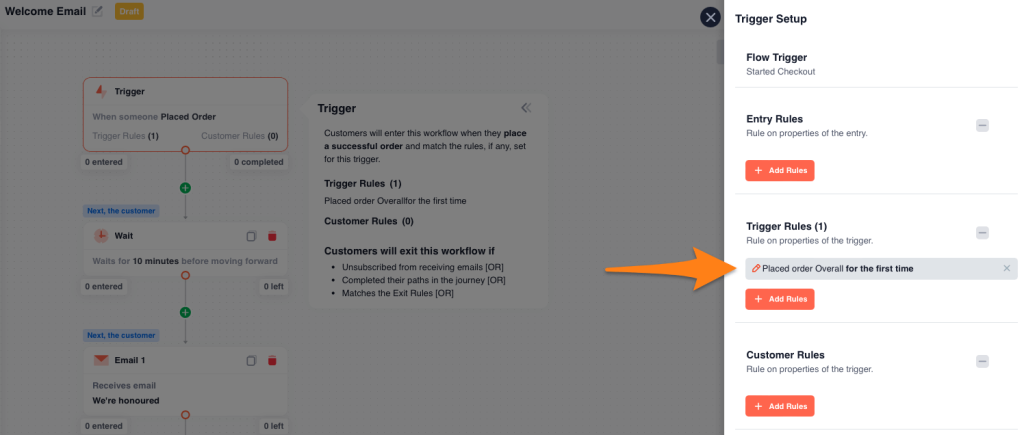
The ‘Wait’ block allows you to set up a time delay, that is, when you want to send the welcome email after the customer has made the purchase.
You can also set customer rules based on the customer properties like name, country, number of reentries allowed, and more.
Step 3: Customize the welcome email template
After the wait block, you will find the 1st ‘Email’ block of the workflow.
Click on it to customize the welcome email flow subject line, preview text, and email content.
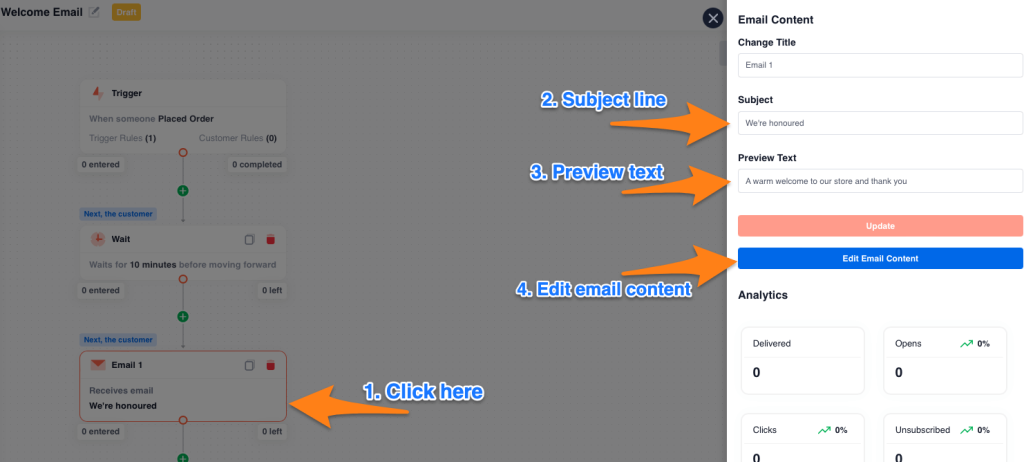
To change the email template, you can click on the ‘Change template’ button.
You can customize every element of your email marketing welcome series design using a drag-and-drop email editor. Click an element on the right side, you will have options to change dimensions, background color, typography, and more.
You can also personalize the ecommerce welcome email flow design using shortcodes like,
- {{billing_address.first_name}} – The first name of the customer.
- {{billing_address.last_name}} – The last name of the customer.
- {{customer_name}} – The full name of the customer (the first and the last name)
Step 4: Create a welcome email sequence
To create a welcome email sequence, you can add more email blocks and their corresponding wait block to the workflow just by clicking the plus symbol at the end of it.
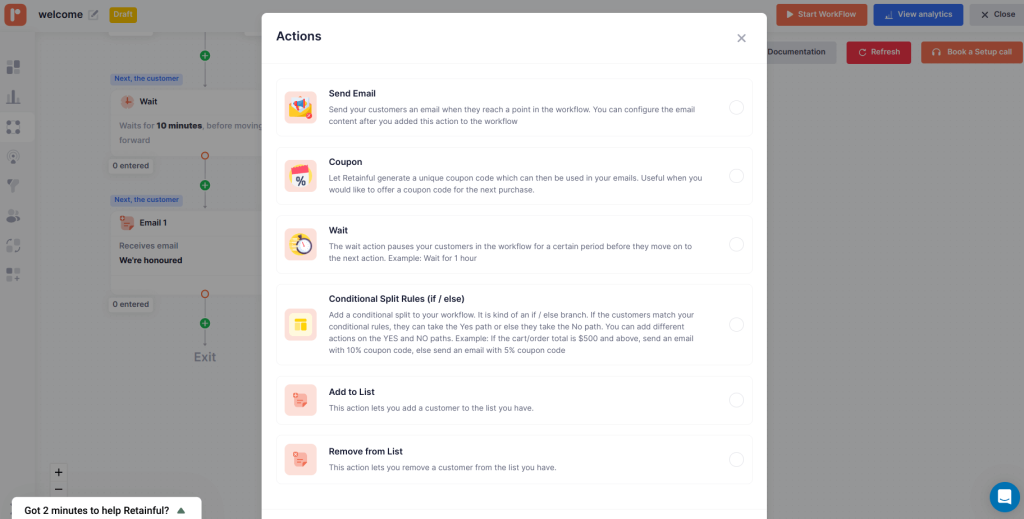
Step 5: Send test email
To check if your automated welcome email has come out as intended, click “Send Test email.”
There you go. You automated an ecommerce welcome email series flow that is poised to convert more.
Advanced Welcome Email Series Strategies for 2025
A/B testing welcome emails with different subject line ideas for welcome emails, content variations, and send times to improve your welcome email open rate and CTR benchmarks for 2025.
Consider implementing a multi-channel welcome sequence and add SMS to your welcome series to increase touchpoints.
How many emails in a welcome series for Shopify stores depends on your business model, but a 3-email welcome sequence template for DTC brands is often most effective.
For advanced users, use email marketing tools for welcome flow triggers, filters, and delays for sophisticated segmentation options.
Best subject lines for welcome discount code emails should create urgency while maintaining brand voice. For example, test variations like “Your 20% off code is inside!” versus “Welcome + Your exclusive discount.”
Personalization of welcome emails using Shopify Flow or other tools + coupon usage reminders can significantly boost conversion rates through dynamic content.
Track revenue attribution for the welcome series to measure ROI and ensure your deliverability checklist for new senders is optimized for inbox placement.
Customize welcome email series easily with Retainful’s drag-and-drop email editor and pre-designed templates.
Wrapping up!!
In a world where first impressions matter more than ever, your welcome email series isn’t just important – it’s essential.
When done right, like the welcome sereis email example above, yours can lead to the first purchase and set the stage for more.
With welcome email automation tools like Retainful, you can send automated welcome emails that don’t feel like one. You can personalize the ecommerce welcome email series and convert more.
Also Read:
- 10 Best Ecommerce Email Examples + Tips
- 9 Best Win-Back Email Examples that Retain Customers
- 15 Best Email Marketing Examples For 2025
- Email Campaigns: 9 Examples + How to create
Frequently Asked Questions
A welcome series typically includes 3-5 emails. This provides enough touchpoints to introduce your brand, offer value, and guide subscribers toward their first purchase without overwhelming them.
A welcome sequence usually starts with an introduction to your brand, followed by emails that offer value (like tips or discounts), showcase popular products, and encourage engagement or purchase.
To write an email welcome series, identify your goals, draft a friendly introduction, offer value in each email (tips, discounts, content), and end with a strong call to action.
Some welcome series email examples are: Introduction and brand story, popular products recommendation, educational content with tips or a guide, feedback request, etc.
A good welcome series is timely, relevant, and value-driven. It builds trust, offers actionable insights, and gently guides subscribers toward a desired action, like making a purchase or engaging with your content.
Welcome emails typically have a conversion rate of 2-4%, though it can be higher with a well-optimized series.
A welcome sequence helps establish a strong first impression, builds trust, and sets the tone for your relationship with new subscribers.
A welcome series flow is the automated sequence of emails sent to new subscribers. It typically starts with a welcome email, followed by value-driven content, product showcases, and a final call-to-action.
To automate welcome email series, firstly, choose an email marketing platform. Secondly, draft your welcome series content and set up triggers based on sign-up. Then, schedule the timing for each email. Finally, test the sequence and launch it.
